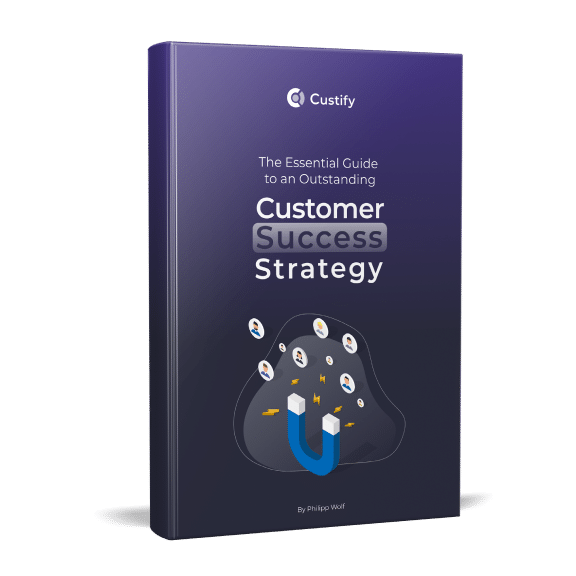Once you start a customer success department it’s very difficult to stop it. The ROI is there, the processes are there, all you need to scale is more people.
Moving past a 1 to 2-person team means hiring more CS people. It’s one of the crucial factors that can determine a business either going completely broke or achieving new levels of growth.
That’s exactly where a Customer Success Representative comes into play.
Here’s why your business, especially if it’s a SaaS, is missing out if you don’t hire more Customer Success Reps.
What Is a Customer Success Representative? – Job Description
In a nutshell, Customer Success Representatives are the people within a company charged with making sure all customers get the value they pay for throughout their relationship with the business.
They’re staying close to the customers, making sure they’re feeling happy about the purchase they’ve made, from the moment they’ve set their eyes on your product/service, to the moment after they’ve made the purchase, and for the entire lifetime of the product.
CSRs are proactive in their approach, meaning that they’re focusing on helping identify any occurring issues and facilitating customers to reach their goals. In time, their role is to build close long-term relationships with your customers, not only providing them with meaningful solutions but also ensuring that they’re having the best experience possible with their purchase.
And even though the role of Customer Success Representative is roughly only 10 years old on the market, it has a 34% annual growth rate (Business2Community). This is due to multiple factors, chief among them being:
- the SaaS boom
- the rise of cloud-based businesses
- the digital transformation triggered by the Covid-19 Pandemic
- and the ever-increasing expectations and demands of customers
Skills and Competencies Needed to Be a Good Customer Success Representative
Onboarding
Onboarding is arguably one of the most important roles of Customer Success Reps. They’re the ones that keep interacting with your customers from the beginning, thus increasing the chances of retaining them. The main goal of user onboarding is to ensure that each customer gets the most out of your product/service, leading to increased retention, loyalty, and significantly lower chances those customers churn in the long run.
Account Management
A crucial part of establishing and maintaining fruitful relationships with your customers is account management. A Customer Success Rep helps the customer customize your solution to be compatible with their needs and goals. Because, at the end of the day, your CSRs need to make sure these individuals are happy with what they’re offered, so your business can keep on growing further.
Customer Support
One of the main roles of a CSR is to make sure all customers efficiently use your business’s product or service. And that’s done through customer support efforts. A trusted Customer Success Rep will usually do this by scheduling calls or demos with your customers, thus giving them efficient training on how to use your solution, while focusing on building those relationships. That’s not to say that customer success reps should take the role of customer support, but rather assist and inform the efforts of the support teams. More on this a bit further down the article.
Soft Skills
Since the main focus of CSRs is to keep your customers happy at all times and just for one-stop purchases only, there are a lot of soft skills that need to be mastered, such as:
- High emotional intelligence and empathy skills
- Analytical and problem-solving skills
- Communication skills
- Relational & emotional intelligence
- Strategic thinking
- Proactivity, resilience & organizational accuracy
Ability to Upsell & Cross-sell
Besides having the social skills to tackle customers’ onboarding, overall health scores, and satisfaction level with your product or service, Customer Success Representatives also need to have the ability to up- and cross-sell. Why? Because that’s where the most efficient business growth stems from. And since they’re always in high contact with your customers, they’re able to pinpoint the most favorable moment for up- or cross-selling opportunities.
Is a Customer Success Representative Different from a Customer Support Rep?
In short, yes. The main difference stems from the type of approach each representative needs to embody when dealing with customers: a Customer Support Rep has a more reactive approach to their interactions, while the Customer Success Rep has a proactive approach.
The main focus of a Customer Support Rep is to solve issues their customers have, and they focus on a case-by-case scenario. By comparison, a Customer Success Rep’s main goal is to keep customers continuously happy, and they focus on the overall growth of the relationship at hand.
Using the two terms interchangeably can really cause confusion. That’s why it’s crucial we define and explore the differences of each and how, when combined, Customer Success and Customer Support can take your business to new levels. We’ve discussed this more here: The Difference Between Customer Success And Customer Support.
Salary & Job Outlook
So, what are the basic salary expectations for a Customer Success Representative? According to Glassdoor, a rough estimate places the CSR yearly average base pay at $48.000.
In terms of job outlook, the forecast is positive: sunny & bright, with a 100% chance of massive growth, as the subscription shift is still in full swing.
In an industry dominated by digital and technology, it’s essential to understand the importance of relationship building and human engagement. Although techy professions might steal the scene in most cases for SaaS businesses especially, people are still relying on hands-on support and mentorship that only a CSR can provide.
For the foreseeable future, as technology continues to grow into every aspect of our lives, customer success will still remain a crucial role overall, as they create and nurture that human link between the product your business offers and your customers. However, since this is an up-and-coming market, customer success statistics are constantly shifting as the business space adjusts to make room for one of its most essential new additions
Customer Success Rep Courses & Certifications
The range of customer success courses is impressive and any new CSRs will gain a lot of value from most of them out on the market. Here are just some of them:
Training courses:
- Customer Experience Management Essentials, available on Udemy;
- Customer Success | How To Listen To Today’s Customers, also available on Udemy;
- Inbound Service Fundamentals, Hubspot Academy, by Hubspot.
Certifications:
- Salesforce Customer Success Strategies, by Salesforce;
- Project Management Institute’s Courses & Certifications;
- Customer Success Manager (CSM) Certification Program, The Success League.
For more options & details, make sure to check out our article about Customer Success courses & certifications that any CS manager needs in 2021.
Educational & Employment Requirements
With so many available courses and certifications, but not all of them actually certified by any standards body, it’s difficult to pinpoint the exact educational requirements of a good CS representative.
It all comes down to having a genuine interest in subjects focused on customer satisfaction and interpersonal relationships. As a rule of thumb, when looking for the right Customer Success Rep, most employers ask for a minimum of 1-year of experience in communications, marketing, sales, account management, or customer success or equivalent in customer success courses/training. Proven IT&C knowledge to learn, understand, and operate software solutions as well as the ability to train others on those same tools.
The Value of Customer Success for an Organization
Growing your CS team with more customer success reps gives you the ability to scale CS and the associated ROI.
There are a lot of reasons why customer success matters in the overall success of a company, here are just a few:
- Improves the renewal process, for more meaningful and successful interactions;
- Reduces churn, based on continuous customer feedback and relevant customer health data;
- Drives revenue, with the abounding opportunities to upsell and cross-sell;
At the end of the day, your business’s overall success is inherently linked to the success your customers’ experience while using your product. If your customers continue to use your solution, your business will continue to grow. And that’s exactly what customer success is all about.
Summing Up
Regardless if you’re a business leader looking into the advantages of customer success or a customer success representative looking to ace the next interview, consider using Custify for all your customer success software needs. And for more info like this – keep your eyes on our blog!




